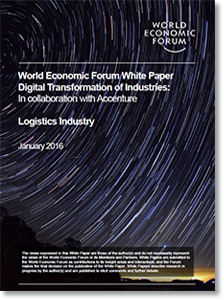Digital Transformation of Industries: Logistics
Digital platforms will become increasingly important in the logistics industry, allowing small companies to have a global reach and compete with the sector’s established giants.
Our analysis indicates that there is $1.5 trillion1 of value at stake for logistics players and a further $2.4 trillion worth of societal benefits as a result of digital transformation of the industry up until 2025.
In other words, industry stakeholders should take notice and come together to prioritize digital transformation initiatives given the potential for significantly higher value to be created for society than for industry.
Over the past two decades, as the Internet revolution swept the world, our day-to-day lives have become increasingly digital.
With email eclipsing ‘snail mail’ and digital downloads replacing physical products, this could well have dealt a devastating blow to the logistics industry.
In fact, something remarkable has happened: more packages than ever before are now being shipped. On any single day, a staggering 85 million packages and documents are delivered around the world.
But logistics businesses cannot afford to rest easy and enjoy the fruits of this global boom in shipments. Logistics has introduced digital innovations at a slower pace than some other industries.
This slower rate of digital adoption brings enormous risks that, if ignored, could be potentially catastrophic for even the biggest established players in the
business. As other industries with close links to logistics, such as retail, are revolutionized by digital technology, the chances of digital disruption engulfing the logistics industry increase – for instance, the rise of e-commerce has led to new digital entrants in the last-mile delivery market.
More significantly, digital platforms will become increasingly important in the logistics industry, allowing small companies to have a global reach and compete with the sector’s established giants. Over the next few years, the race to build a dominant global platform will transform the customer’s experience of logistics and will be the central issue in determining which enterprises will be the winners and losers in a truly digital logistics industry.
With the logistics industry suffering from some very significant inefficiencies – for instance, 50% of trucks travel empty on their return journey after making a delivery – digital transformation can also bring important social and environmental benefits, by increasing efficiency and cutting down energy consumption and emissions.
What’s Related




Favorites





